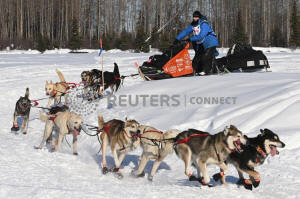Socially distanced Iditarod sled dog teams dash off from secluded Alaska
river site
 Send a link to a friend
Send a link to a friend
 [March 08, 2021]
By Yereth Rosen [March 08, 2021]
By Yereth Rosen
ANCHORAGE, Alaska (Reuters) - Forty-six
mushers and their teams of huskies dashed off into the Alaska
wilderness on Sunday in a socially distanced start to the annual
Iditarod Trail Sled Dog Race, embarking on a course drastically
altered by the coronavirus pandemic.
The starting gate of the 2021 event was placed off-limits to the
usual crowds of cheering spectators, and few if any fans are
expected along the abbreviated route for this year's 49th running of
the world's most famous sled-dog marathon.
Access to the starting area - a secluded spot at the edge of the
frozen Deshka River in Willow, Alaska, about 75 miles north of
Anchorage – was generally restricted to competitors, essential race
personnel and media.
The staggered launch of the race began with Iditarod veteran Aaron
Peck of Grand Prairie, Alberta, Canada, followed by rivals charging
onto the trail one team at a time every two minutes amid sunny skies
and a clamor of barking and yapping.

Victoria Hardwick of Bethel, Alaska, was last out of the chute,
rounding out the smallest field of contestants since 1978. A 47th
musher on the roster scratched hours earlier due to a non-COVID-19
family health concern, race organizers said.
The weather was relatively balmy by Alaska standards, with
temperatures climbing to at least 25 degrees Fahrenheit, the warmest
Iditarod start on record, though the mercury was expected to plunge
on the trail as the day wore on.
But the biggest change this year was in diverting the finish line
far from the Bering Sea gold-rush town of Nome, the usual end point
for a race commemorating the legendary diphtheria serum run to Nome
by dog sled teams in 1925.
Instead, the 2021 race will run to an uninhabited checkpoint called
Iditarod and an abandoned mining settlement named Flat, then turn
around for a second leg sending mushers back to Deshka Landing for
the finish.
The total distance is about 860 miles, roughly 100 miles shorter
than the traditional route to Nome.
"This is kind of a different year. It's going to be a little odd
going on the trail," 2018 champion Joar Leifseth Ulsom, a native
Norwegian who lives full time in Alaska, said on Sunday before the
start. He is considered one of this year's favorites.
[to top of second column] |

Four-time Iditarod
champion Dallas Seavey rounds a corner on the Susitna River on the
Iditarod Sled Dog Race course drastically altered by the coronavirus
pandemic at Deshka Landing in Willow, Alaska, U.S. March 7, 2021.
Bill Roth/ADN/Pool via REUTERS

VIRUS-ALTERED ROUTE
The coronavirus-altered route is designed to minimize contact with
residents of the region.
Even where the trail nears villages, checkpoints are isolated with
restricted access. The route skips all the native Athabascan
villages along the Yukon River and all the Inupiat villages on the
Bering Sea coast.
The mountains of the Alaska Range will pose the greatest challenge
to competitors this year, with mushers routed across the range twice
in two directions.
This year's highly competitive field includes Leifseth Ulsom and
three other returning champions - four-time winners Dallas Seavey
and Martin Buser, and 2019 victor Pete Kaiser.
Also competing are the Iditarod's top women - Aliy Zirkle, planning
to retire after this year's race, and Jessie Royer, who finished
third the past two years.
The Iditarod, as it has every year, faced criticism from
animal-rights activists condemning the event as inhumane, putting
pressure on race sponsors.
Exxon Mobil has said it will end its longtime sponsorship after this
year's race.
The Iditarod, however, has gained some new sponsors and is drawing
revenue from a subscription service sending video directly to fans.
(Reporting by Yereth Rosen in Anchorage, Alaska; Editing by Steve
Gorman, Diane Craft and Himani Sarkar)
[© 2021 Thomson Reuters. All rights
reserved.] Copyright 2021 Reuters. All rights reserved. This material may not be published,
broadcast, rewritten or redistributed.
Thompson Reuters is solely responsible for this content.

 |